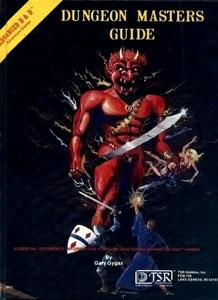David C. Sutherland III
David C. Sutherland III | |
|---|---|
| Born | April 4, 1949 |
| Died | June 6, 2005 (aged 56) |
| Resting place | Fort Snelling National Cemetery |
| Nationality | American |
| Known for | Fantasy art, game design |
David C. Sutherland III (April 4, 1949[1] – June 6, 2005[2]) was an early Dungeons & Dragons (D&D) artist. Sutherland was a prolific artist and his work heavily influenced the early development of D&D.
Early life and inspiration
Sutherland was born April 4, 1949[1] in Minneapolis, Minnesota and was a graduate of Minneapolis' Roosevelt High School.[3] He trained as a commercial artist for two years at the Minneapolis Area Vocational Technical Institute before serving in the United States Army as a military police officer in the Vietnam War, serving in 1969–1970.[3] After his return from the war, he began his career as a fantasy artist, while working odd jobs.[2] His artistic talents were nurtured and developed by his father, a fellow artist. David C. Sutherland II worked in the paper industry and encouraged his son by bringing home creative materials and supplies.
He became involved with the Society for Creative Anachronism (SCA) in the early 1970s. He spent his free time drawing sketches and cartoons related to these pastimes.
Career

Sutherland's involvement in game art began in 1974. After meeting Michael Mornard, a player in Gary Gygax' "Greyhawk" and then Dave Arneson's "Blackmoor" in the SCA, he was introduced to Professor M.A.R. Barker at the University of Minnesota in 1975. Barker was designing Tékumel, an imaginary world for use with D&D, published by TSR, Inc., the Wisconsin-based company that became the dominant publisher of role-playing games.
The professor put him in touch with TSR,[2] and soon after, Sutherland was working for TSR.[when?] Sutherland worked with the D&D game's co-inventor, Gary Gygax, as part of a team of illustrators, including Erol Otus, Darlene Pekul, David Trampier, and others.[2] Sutherland also worked as TSR's artistic director, but preferred working on his own illustrations.[2] He worked at TSR until 1997 when the company was in the process of being purchased by Wizards of the Coast and he was not offered further employment.[2]
After his relationship with TSR ended, Sutherland found it difficult to find work and, according to friends, felt abandoned by the gaming industry.[citation needed] Recently divorced,[when?] Sutherland remained upset about the dissolution of his marriage,[2] became despondent and his health began to fail.[citation needed] An auction of Sutherland memorabilia—including artwork, miniature sculptures, games, and game memorabilia—was held in 2004, raising USD$22,000, used to set up a trust fund for his two daughters.[2]
He died of chronic liver failure on June 6, 2005 in his home in Sault Ste. Marie, Michigan.[2][4] He was buried on June 22, 2005 with full military honors at Fort Snelling National Cemetery in Minneapolis, Minnesota.[2] He is survived by his two daughters, Susan and Heather, and his mother, sister, and brother.[5]
Notable works
- He wrote the adventure module Queen of the Demonweb Pits (Q1) (with some editing from Gary Gygax).
- He created the wemic, a D&D lion-centaur.
- He drew the famous and popular isometric maps of Castle Ravenloft for the 1st Edition Advanced Dungeons & Dragons (AD&D) adventure module Ravenloft. As the newly revised version of the module, Expedition to Castle Ravenloft, explains in the introduction, these maps were "such a powerful aid to play that a generation of Dungeon Masters still fondly recall them and reemploy them whenever possible." Sutherland is even honored in the story of this newest version of the Ravenloft module, as there is a mention of a "Dhavit Uthurlan" as the designer of the castle.
- He is the cover artist for the first edition rules of the AD&D Dungeon Master's Guide.[2]
- He illustrated the scene of a dragon, a wizard and an armored archer on the first D&D boxed set, "A simple composition, it shows a wand-waving magic user and a knight, his longbow drawn, squaring off against a dragon who sits – à la Smaug from The Hobbit – atop a vast pile of gold coins and jewels."[2]
- He also illustrated the original cover of the first edition Advanced Dungeons & Dragons Monster Manual.[2]
References
- ^ a b "United States Social Security Death Index," index, FamilySearch (https://familysearch.org/pal:/MM9.1.1/JT69-9Y8 : accessed 12 Feb 2013), David C Sutherland, 6 June 2005; citing U.S. Social Security Administration, Death Master File, database (Alexandria, Virginia: National Technical Information Service, ongoing).
- ^ a b c d e f g h i j k l m "Dungeons and Dragons artist dies". CBC News. June 15, 2005. Archived from the original on 2008-06-30. Retrieved March 2, 2010.
- ^ a b Hahn, Trudi (21 June 2005). "Illustrator David Sutherland dies at 56". Star Tribune. p. B6. Retrieved 21 April 2012. (subscription required)
- ^ "Obituaries: David Sutherland". The Washington Post. 18 June 2005. p. B7. Retrieved 20 April 2012. (subscription required)
- ^ Science Fiction & Fantasy Writers of America obituary for Sutherland at the Wayback Machine (archived June 26, 2006)
External links
- "David Sutherland at the Pen & Paper RPG Database". Archived from the original on September 27, 2007.
- David C. Sutherland III at Find a Grave
